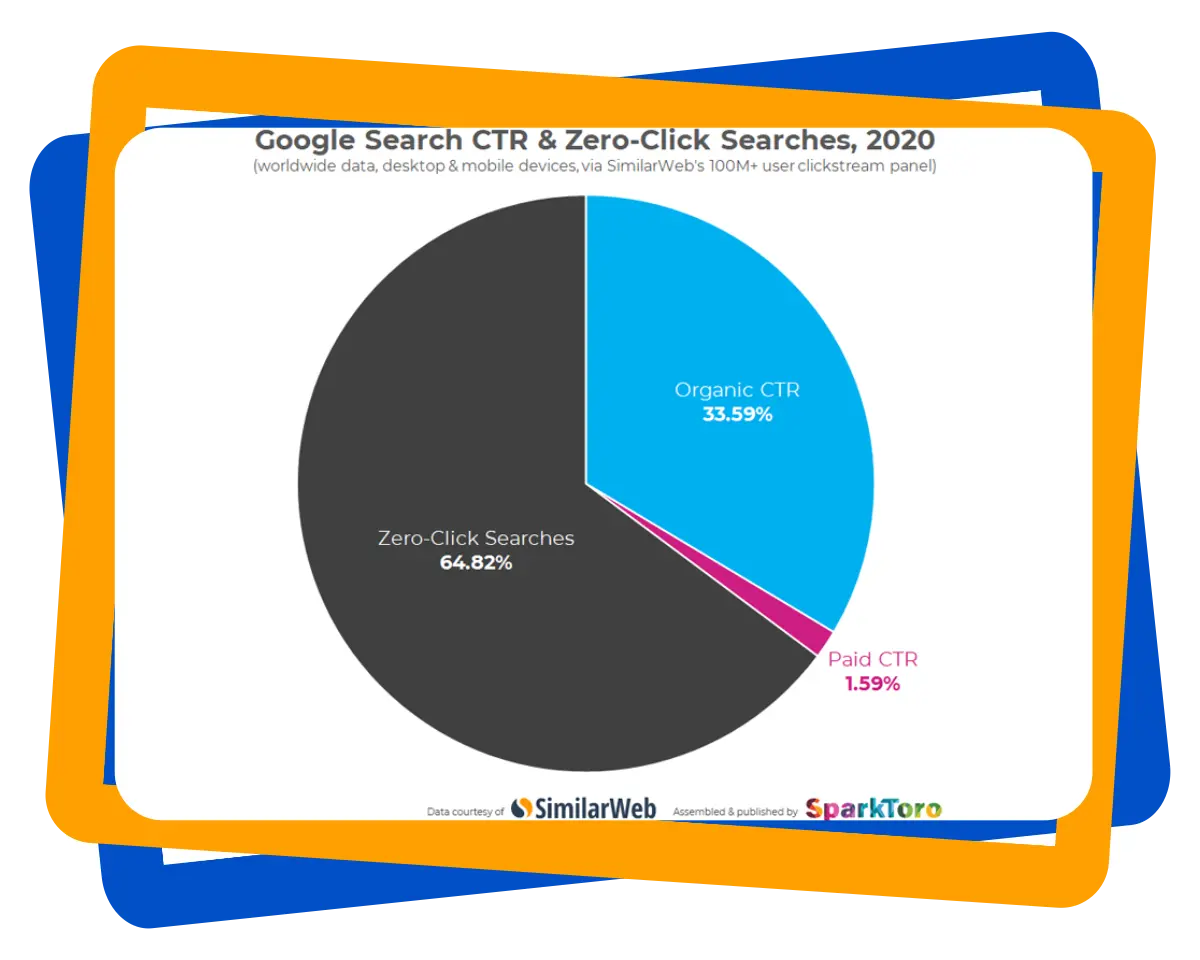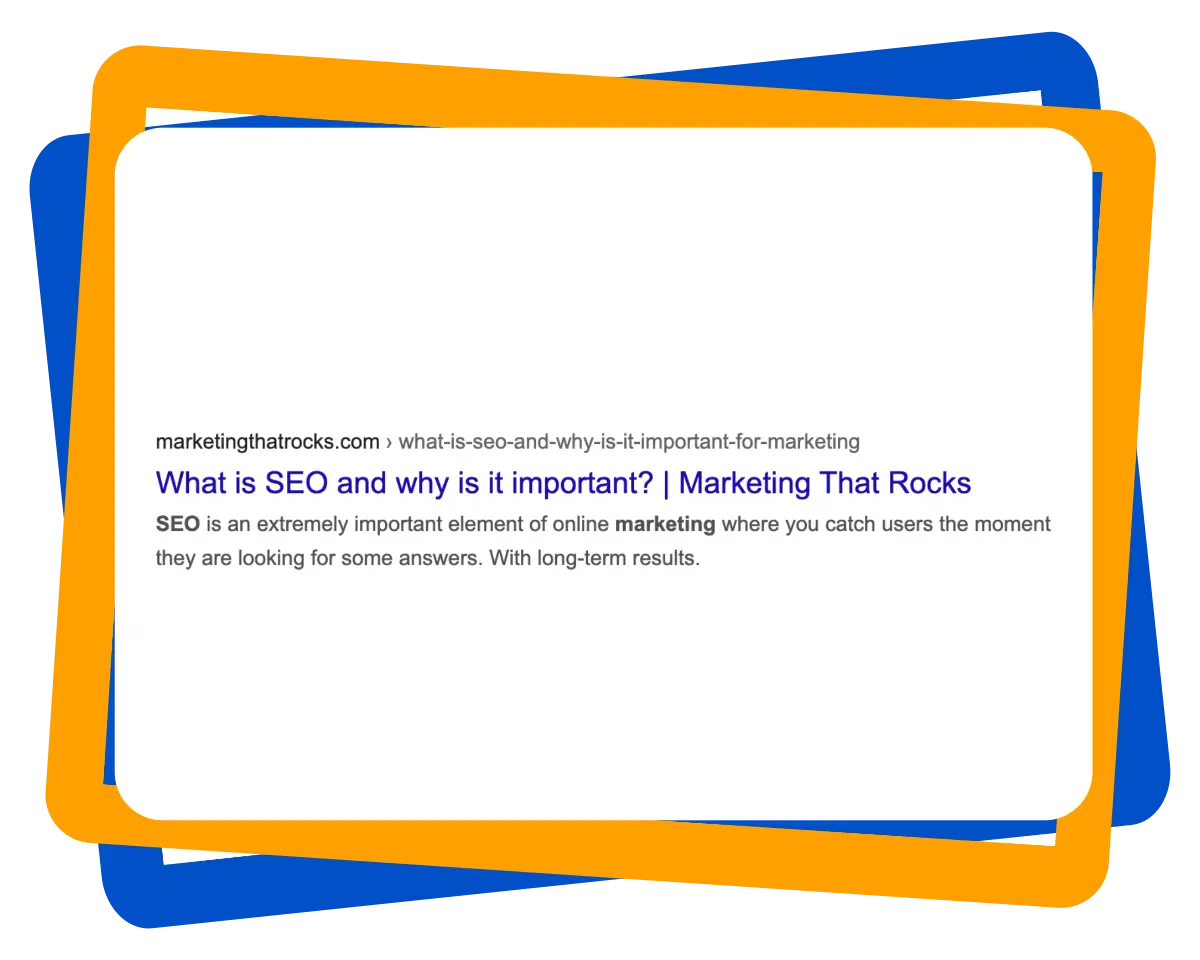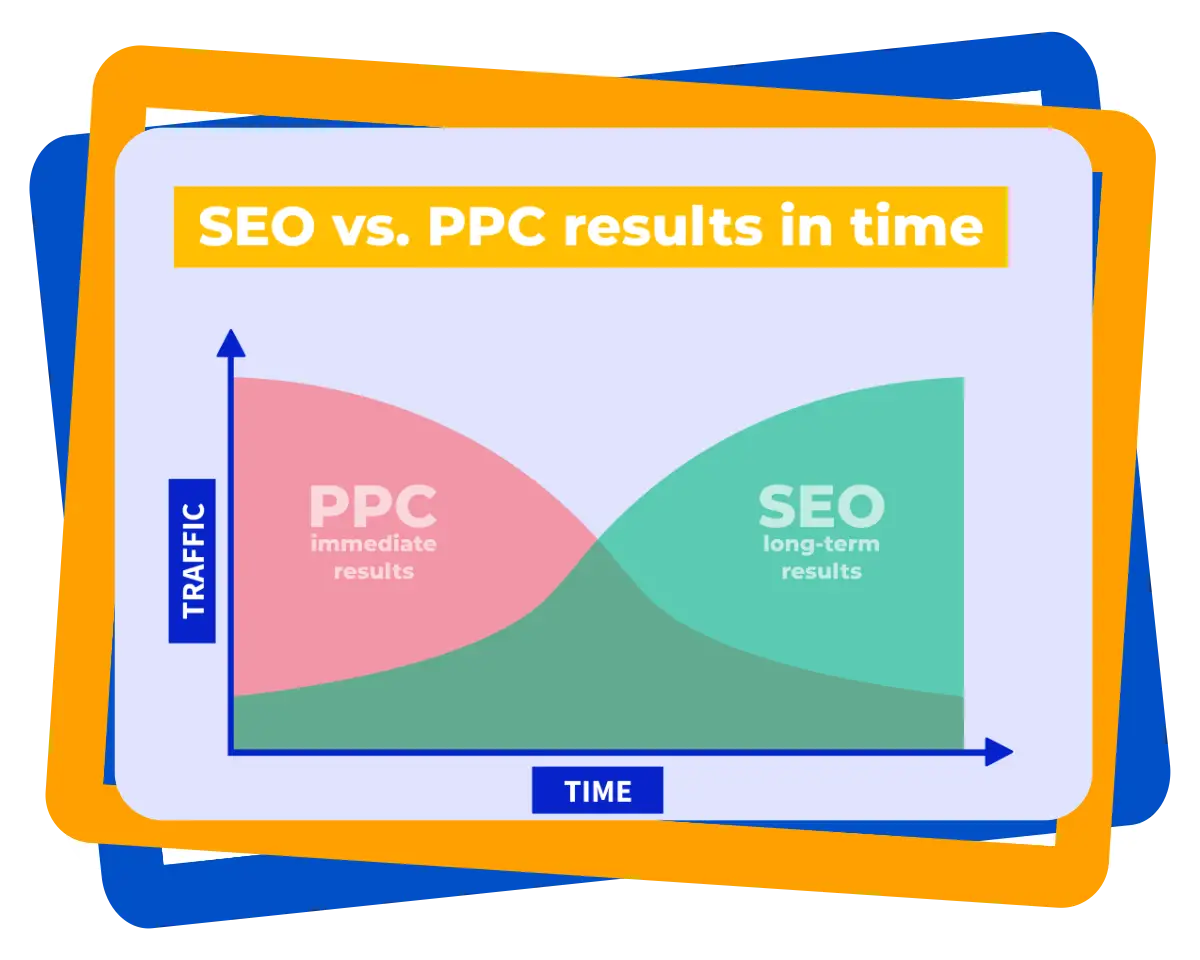SEO or search engine optimization (optimization to help search engines find you) is a marketing process of optimizing a website and its content focused on increasing your visibility in organic search engine results. It happens through improvements on your pages, with technical improvements and links to other, relevant sites. The goal of SEO optimization is to increase traffic from the web browser to your website so as to improve your position on search results.
That’s the official answer to the question “What is SEO”, but I know definitions don’t help much. Read this little guide through SEO and find out the answer to that and other related questions.
In this article you will find out:
- What is SEO
- How SEO works
- Why SEO is important
- What is the difference between Google ads and SEO content
- What types of SEO optimization are there?
- How long does it take for SEO to show the first results?
How does SEO work?
SEO is not something you create and pay for like Google ads to see impact immediately. That’s why companies often “don’t believe in SEO”. SEO is not a religion that you should believe in, but it is certainly something that is less tangible than ads.
Although by SEO optimization we most often mean Google, we should not forget that there are other search engines where people search.
Search engines have their own bots (robots or computer programs that execute commands independently, and often include elements of artificial intelligence) that search pages on the web, going from page to page, collecting information about those pages, and putting them in the index.
The algorithms then analyze the pages that are indexed, taking into account hundreds of ranking factors and signals, to determine the order in which the pages will appear in search results for a given query; maybe a query from your ideal audience. In translation: when you type ” how to fix a water tank “, the algorithm determines which results it will show you. What you are presented with is not set in stone; search tomorrow and the results may change.
You can’t pay search engines to be the first result a seeker sees. That only happens with paid advertisements. Organic unpaid positions must be earned with quality, and users – your audience – are looking for quality, not ads.
Why is SEO important? Advertisements vs. SEO
When you search Google to solve a problem, are you looking for ads or specific content that will clearly convey your problem is understood? You want to see that your problem can be solved, right?
If you’re like other people, you probably don’t care about ads as much as you care about finding a solution.
Therefore, it is not surprising that clicks on SEO organic results (unpaid) are 10X higher than clicks on Google search ads. Here’s another surprise: conversions from Google ads are only 4.4% across all industries, while SEO results generate about 14% of conversions.

SEO is an extremely important element of online marketing and really shows its power when you catch users the moment they are looking for some answers, your answers.
This is called pull marketing, content that pulls in the interest of your audience, the seeker, just when s/he wants to find it.
Ads, on the other hand, are part of push marketing or interruption marketing; they appear when you don’t necessarily want to see them, and they interrupt your activities (TV commercials, banners, FB sponsored posts, etc.), trying to entice you to click on a link that’s not particularly important to you now.
Types of SEO optimization
SEO is not only done on your website. For example, video content on YouTube can also be optimized to make it easier for users to find your channel.
SEO is more and more complicated, and more often we talk about separate SEO areas:
- on-page SEO – title tags, H1-H6 tags, images
- technical SEO – enable the web to be crawlable (robots.txt file, sitemap, search console)
- off-page SEO – link building to build authority and credibility with other sites
- Content SEO – revolves around keywords and content production
- YouTube SEO – how to get people to find you through video content on YouTube
- Local SEO – add a local business scheme to the homepage, open Google Business, etc
- Mobile SEO – user experience, mobile-ready
- eCommerce SEO – category optimization, product page, special category is Amazon SEO
It is best to define SEO optimization to these categories as it will be easier to create and implement your ideal optimization plan.
Investing in SEO is very profitable, but still, most companies do not see beyond a Facebook page, boost a post, or Google ads when it comes to digital marketing. How to convince the responsible person in the company to give SEO marketing a chance?
Why is it so hard to convince people to invest in SEO? Because SEO is “invisible.”
Fear and misunderstanding are the most common reasons why someone does not want to decide to invest in something. I’m not just talking about SEO, it’s the same thing when you start explaining bitcoin, research, and investments in future technology that are not yet evident. It’s easy to invest in real estate. You build it and see it, it is at that address, and you can sell it. But why on earth invest in SEO?
If you are responsible for online traffic for your business, marketing and sales, you must have heard about SEO and started researching it. Now you would like to either learn more on your own or hire an external professional or agency to optimize your web with technical and content improvements with the aim of increasing traffic and increasing conversions. Let’s say you are just the person responsible for marketing and sales and you want to convince your boss to invest in SEO.
Let’s imagine this conversation scenario:
You: “ We should invest in SEO. I want to hire an SEO expert to review our website .”
The boss gives you one of these answers:
- What is SEO?
- SEO is a scam.
- We don’t have money for SEO right now.
- We don’t have time for SEO, I need some urgent result
- Why don’t you learn by yourself?
Let’s go through all these answers step by step and find a way to convince her/him to give SEO a chance.
- “What is SEO?”
If the person in charge asks you what SEO is, don’t get caught up in the definitions. Explain to her/him in simpler language.
For example:
SEO is a way of promoting our website, or its content, through search engines. We need to have a technically functional site and then invest in good content so that people can find us. SEO means organic unpaid traffic from the Google search engine, and if the company manages to rank among the TOP 3 positions among the search results for some important keywords, the traffic to the website and conversions will increase.
Do you have brick and mortar locations? It is extremely important for our store to have local SEO, that is when you see the name of the company with the phone number and working hours on the site, and people write reviews there. We will earn more in the long term because we will be found by people who are looking for something in their neighborhood and when they have great motivation and need.
The result of SEO is what you see on the search engine when you search for something, without the word “Ad” in front of it, for example:

What happens when additional questions start, “And why are ads or Facebook suddenly not good?” Well, simply, people don’t like advertisements, and they are short-term; when your money runs out, their impact does, too.
2. “I don’t believe in SEO”
Many do not believe in SEO. It’s not an SEO religion that you don’t believe in, but the truth is that its effect is invisible to many people because it doesn’t have some tangible mass like a new building. SEO is a tactic and it takes some convincing for others to decide to invest in the tactic.
Maybe the boss has already been burned with SEO. Maybe s/he worked with some people who told her/him about the power of SEO and paid them, but they were not good and the money went to waste. Maybe s/he had experience with ‘black hat’ SEO tactics, so her/his website was penalized after various Google updates, and now s/he is afraid that the same thing will happen again. Maybe s/he just gave up too quickly, which is a very common case.
Explain to the boss what s/he can expect from SEO, why s/he had negative experiences in the past, and excite her/him with one of the many statistics.
Here are some great ones:
- SEO leads to conversions in 14.6% of online sales
- 85% of retailers agree that SEO and paid Google search ads are most effective in attracting new customers
- 50% of all mobile searches refer to local results found through SEO
- 80% of all local searches end in conversion (wow!)
3. “We don’t have money for SEO right now, we invest in ads”
Comparing ads and SEO is comparing pears and apples. Yes, they are both fruits, i.e. they fall under the same niche, they aim to satisfy the hunger for something healthy, but they actually work differently for the body.
Ads are great for new businesses just starting to build brand awareness, but they’re also a great complement to SEO. Because if you’re depending on ads as your only tactic to attract users online, I hope you have a lot of money. Ads last as long as you have money, so you need to invest again. Investing exclusively in ads is often much more expensive for a company in the long run than investing in SEO. Once the ads stop, so does your visibility.
Let me explain in the graph below:
If you have $10,000 and invest it all in ads, they will appear immediately and provide impact as long as you have money.
If you have $10,000 and invest everything in SEO, you won’t see any results on the SERP for the first few months, but then (if everything is done well), growth starts, and lasts longer with regular maintenance.
Investing in SEO is more profitable than many other investments, especially if we measure long-term effectiveness.
4. “We don’t have time for SEO, I need some urgent results”
SEO is slow but effective, I say that often. It is also known that “SEO is a marathon, not a sprint.”
True, SEO takes time. You can see the Google ad immediately. As long as you have money to advertise, you’re on the first page of results and you’re happy. But you may not know that clicking on ads is 10x LESS than clicking on organic results on the first page.
An organic result is an unpaid result, and only SEO is responsible for it.

SEO takes time; a good comparison is with gardening where you also have to wait a while to see the first results.
If someone promises you that you will be the first on Google very quickly and guarantees you these results, be afraid, be very afraid.
SEO gives results in six months and up to a year or two, and it is quite understandable that it is not the first choice for many people’s marketing tactics. People like to see results immediately. In addition, through Google ads, they can immediately be “first on Google”, at the very top of the page, while in fact, no one can guarantee you the first organic place on the SERP (page with search results).
Now, we’re not against ads. Ads are a good tactic to attract users from the search engine while you are working on SEO optimization, and also later to secure as many positions as possible on the SERP. I am in no way advocating to stop investing in Google Ads.
While the Google ads campaign is running, you prepare the content for optimization; improved visibility to the search engines and, as a result, improved visibility to your buyer. Focus on the quick and efficient things you can do while building a strong and long lasting foundation.
When the responsible person sees some results from local SEO activities, s/he may decide to invest more at a later stage.
5. “Why don’t you learn and do it yourself?”
Employers often ask employees to do the work of three people, and then they also expect that employee to follow trends and learn and research on his own. Some companies have a great practice of freeing up one day a week for learning so that the employee has the opportunity to engage in education and study independently.
You might be able to do a good deal of non-technical SEO for your website yourself, but you need clear guidelines and don’t have time to learn so much about SEO. After all, there is so much different information online that you get lost and don’t know where to start or what to actually do. SEO is an extremely extensive series of techniques and, if you start learning everything yourself, you may be overwhelmed by the amount of material.
Especially when you first encounter the sea of SEO terms and acronyms.
You should also know how to write texts for the web. In addition to writing, you need to know the basics of technical SEO in order to better understand how a website works. Because the content itself is not the only factor that plays a role, although it is sometimes decisive.
So, can you tell we’re big believers in this technique for your marketing results? You can learn more here.






